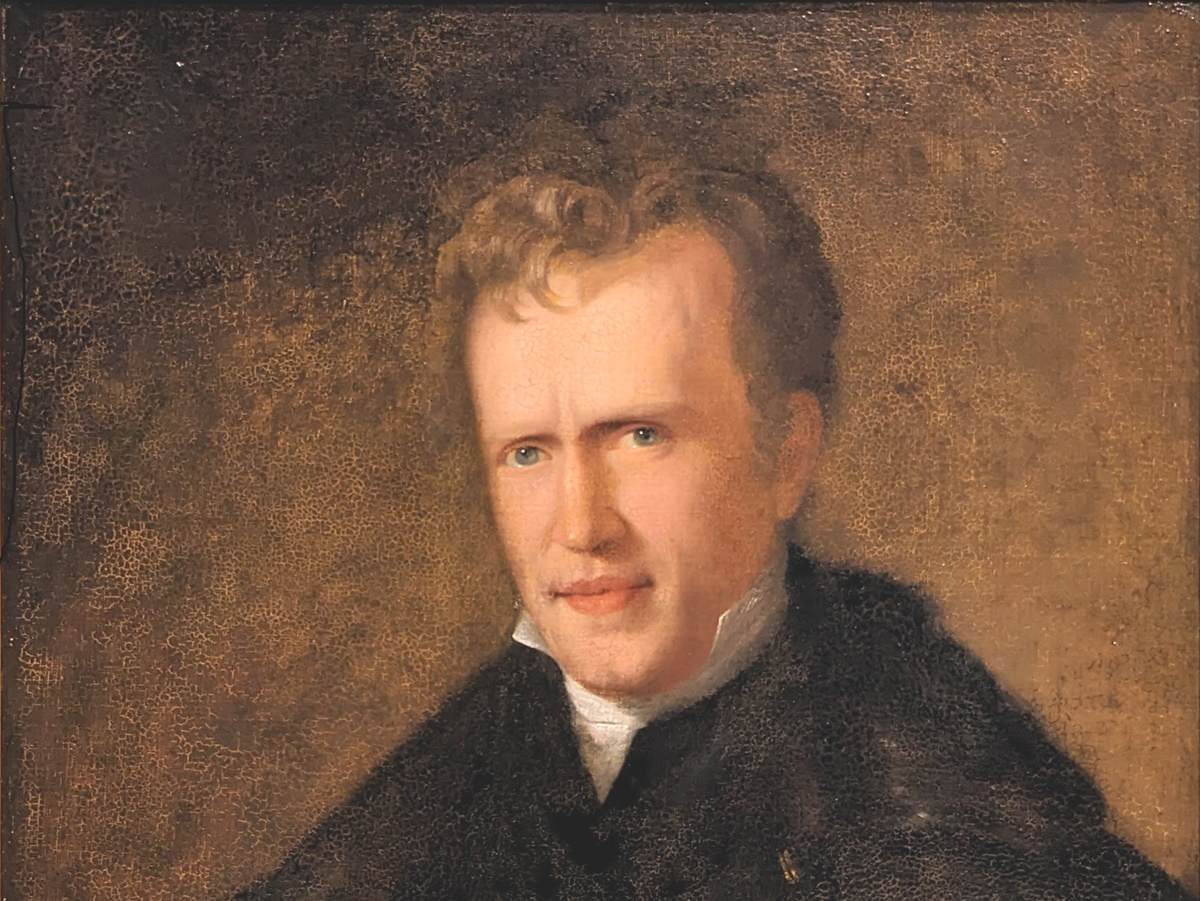During his lifetime, John Neal was as popular a novelist as Stephen King, as outspoken an activist as Gloria Steinem and as influential a critic as Harold Bloom. He’s forgotten now, but he had a huge influence in the years between the War of 1812 and the Civil War.
Neal advocated pugnaciously for a range of causes—women’s rights, American literature, abolition, temperance, bans on dueling and lotteries, Native American rights and healthful living. He used his pen as his chief weapon (though sometimes he used his fists). He wrote novels, short stories, poems, literary criticism, art criticism and newspaper columns.
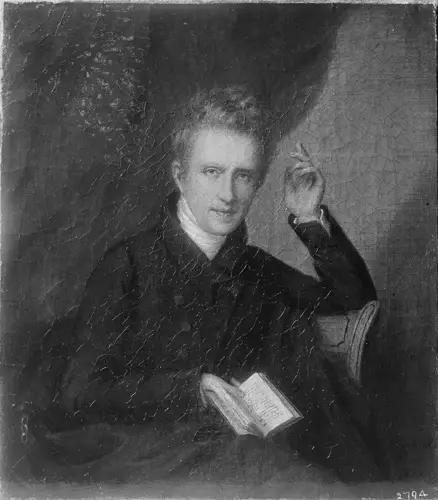
John Neal in 1823, by Sarah Miriam Peale
Neal also succeeded in business (well, after a few failures). And he practiced law.
Critics say he scattered his genius and never produced a masterpiece. He wrote quickly, learned quickly and angered quickly.
One scholar called him “half-wild man, half genius.” Edgar Allan Poe, whose career Neal promoted, wrote that he was “inclined to rank John Neal first, or at all events second, among our men of indisputable genius.” But, Poe added, his work was ‘massive and undetailed”, “hurried and indistinct”, and “deficient in a sense of completeness.”
The title of his 1869 autobiography captures his essence: “Wandering Recollections of a Somewhat Busy Life.” In the prologue, he argues that a book doesn’t need a prologue.
John Neal
He was born in 1793 in Portland, Maine, to Quaker parents who were schoolteachers. His father died a month after John and his twin sister were born. His mother, to make ends meet, took in boarders and started a school. Young Neal left her school at 12 to support the family. He led a somewhat itinerant life, picking up work where he could find it.
A business venture failed in 1816, so he moved to Baltimore, where he found his métier – writing. While working as an unpaid apprentice in a law office, he wrote poems, essays and literary criticism for a magazine called The Portico. He received no payment for his published work, though, so he turned to novel writing. Within a few years he established himself as one of the preeminent American novelists.
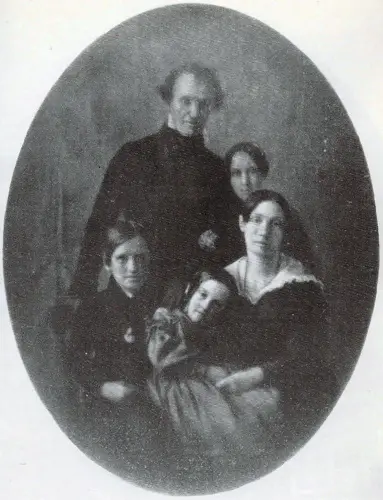
Neal married his second cousin Eleanor Wall in 1828, and they had five children. This family portrait was taken in 1843.
Europe and Back
Then in late 1823, John Neal sailed to London because of a comment someone made to him at a dinner party. It was an insult to American writers: “In the four quarters of the globe, who reads an American book?” Neal crossed the Atlantic to vindicate American literature. In London, he contributed to Blackwood’s Magazine, a literary journal. He was the first American writer published in a British literary journal.
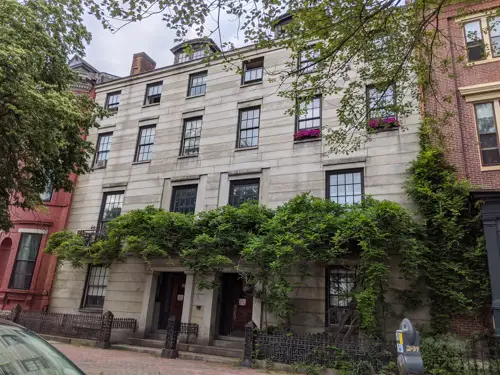
John Neal and his family lived in this house in Portland.
He returned to his native Portland in 1827. He’d intended to settle in New York, but Portlanders criticized him so vociferously he decided to stay. He had mocked prominent citizens in one of his novels, and he’d offended many with his use of regional dialect and criticism of some American authors. Neal’s detractors blocked his acceptance to the bar and got into verbal and physical fights with him in the streets.
He began to devote more time to business and social activism, less to novel writing. But he did write short stories, about one a year. Critics consider them his best literary achievement, and he’s been called “the inventor of the American short story.” He also wrote children’s books.
Neal died in 1876, a wealthy and respected man of letters, businessman and civic leader.
Here are seven fun facts about the wild genius, John Neal.
1. First To Use Cuss Words in a Novel
He was the first person to use “son of a bitch” in fiction. He was also probably the first to capture the Downeast Maine dialect. Neal believed strongly in American literature that did not mimic British affectations. He is credited with developing a distinctly American literary style, followed by Ralph Waldo Emerson and Walt Whitman.
Through his work as an editor of Yankee magazine, he helped launch the careers of Nathaniel Hawthorne, Henry Wadsworth Longfellow, Edgar Allan Poe and John Greenleaf Whittier.
People didn’t always appreciate him. In his 1825 novel “Brother Jonathan,” he irreverently presented American dialects — Scottish, Penobscot Indian, New England and Virginian. Reviewers took it as a slander against the United States.
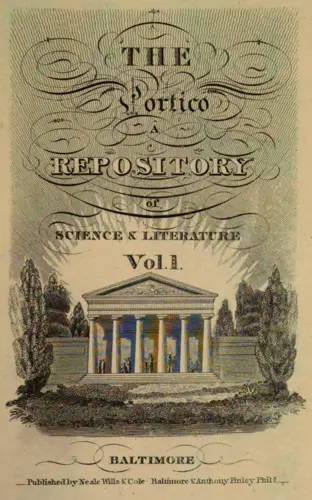
The Portico, magazine to which John Neal contributed poems and essays
2. He had good handwriting.
Neal had a clear hand and wrote fast, which enabled him to make a living teaching penmanship before he got rich and famous. He also worked as a haberdasher, ran a dry goods store, worked as a secretary to the English philosopher Jeremy Bentham and bought contraband smuggled through British lines during the War of 1812.
Later, he developed real estate, ran granite quarries, speculated in land and sold life insurance.
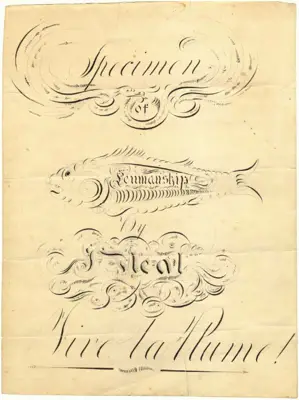
Advertisement for Neal’s penmanship classes
3. Anger Management Issues
John Neal got into a lot of fights. At 10 he made and sold lollipops to his schoolmates. When they didn’t pay as promised, he beat them up. In Baltimore, he got into a street brawl that caused the Quakers to excommunicate him. At 79, he threw a man in his 20s off a streetcar. His victim had smoked a cigar on the nonsmoking vehicle.
4. John Neal Hated Titles
He refused to call judges “Your honor.” Neal had dropped out of school at 12, but he trained as a lawyer at a time when admittance to the bar didn’t require a law degree. As a Quaker, he believed “there is no greater humbug in the minds of men than this obsequious bowing to men of high station.”
5. Buddies with Robber Baron’s Grandfather
He partnered with J.P. Morgan’s grandfather, John Pierpont, in smuggling during the War of 1812. Pierpont, his brother-in-law J.L. Lord and Neal set up stores to sell contraband British goods in Boston, Baltimore and Charleston. The war ended, recession followed and the partnership declared bankruptcy.
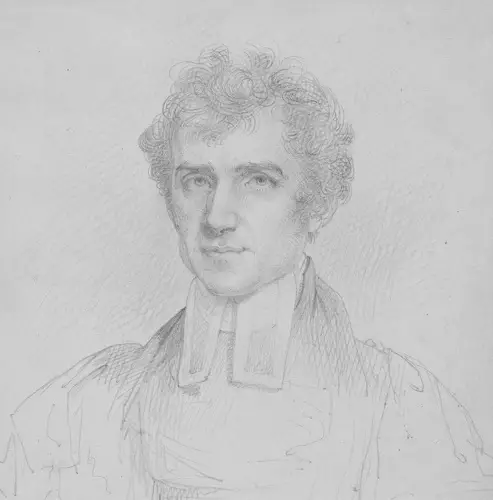
John Pierpont, by Rembrandt Peale
6. John Neal, Gym Rat
He was the first American to open a public gym in what is now Portland’s Market Square. (Americans had opened private gyms, and Germans had opened public gyms.) Neal thought athletics channeled aggression, a problem with which he struggled.
He also started gyms in Saco, Maine, and at Bowdoin College. When members of his Portland gym voted against letting a Black person join, he cut ties to it.
Neal also taught boxing and fencing in his law office and promoted gymnastics. Once he urged Thomas Jefferson to start a gymnastics school at the University of Virginia.
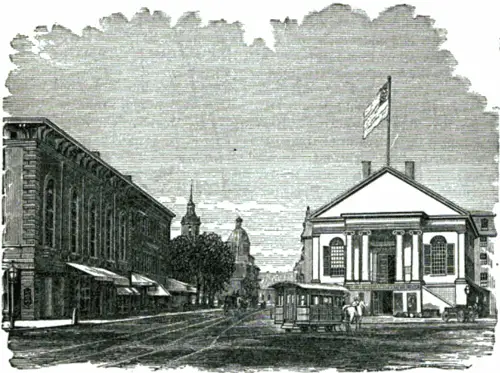
Portland’s Market Square, where Neal had his first gym
7. Women’s Libber
He championed equal pay for women. Neal also championed a lot of other women’s issues and promoted women writers in the magazines he edited, including, The Yankee. He delivered speeches on women’s rights to large crowds in New York City and on the lyceum circuit. Neal included women characters and women’s issues in his fiction, and in 1868, he cofounded the New England Woman Suffrage Association. Two years later, he organized the first public meeting on women’s suffrage in Portland.
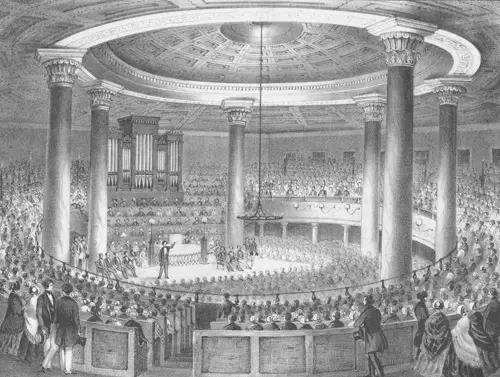
The Broadway Tabernacle, where Neal spoke to 3,000 people about women’s rights
Images: Neal home in Portland By Dugan Murphy – Own work, CC BY-SA 4.0, https://commons.wikimedia.org/w/index.php?curid=92122856. Featured image: John Neal by Sarah Miriam Peale.
